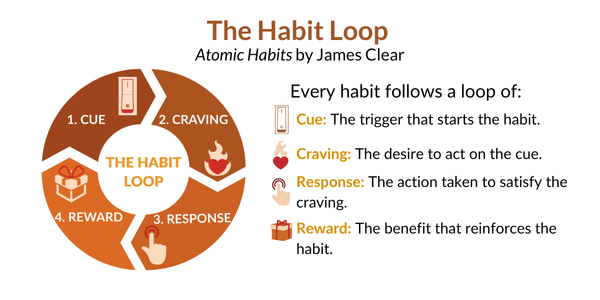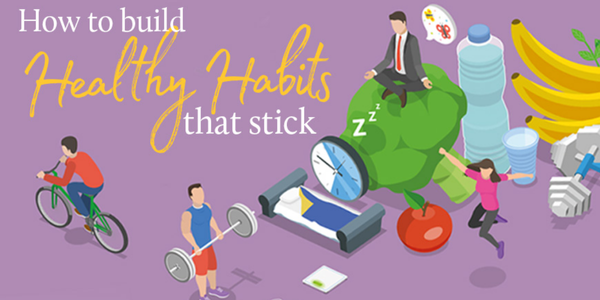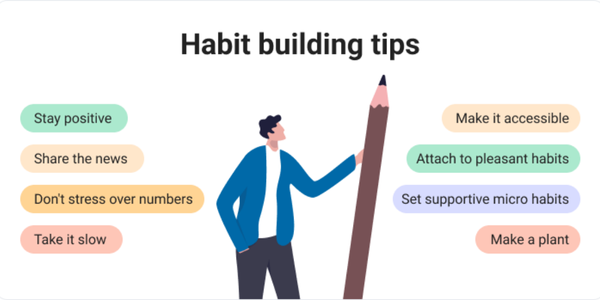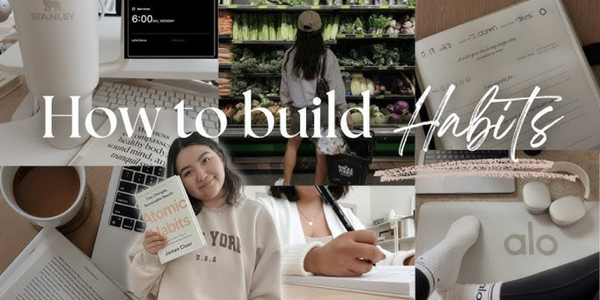Creating a new habit sounds simple: just do something repeatedly until it becomes second nature. But if you’ve ever struggled to stick with a workout plan, wake up earlier, or cut down on social media, you know there’s more to it. So how do you build new habits that actually stick?
Whether you’re trying to improve your health, boost productivity, or just live more intentionally, this guide will walk you through the psychology, strategy, and daily practices that make new habits sustainable—for life.
Why Most Habits Fail (And What You Can Do About It)
Let’s start with a hard truth: most people fail at building habits not because they’re lazy, but because they lack the right system.
Common Reasons Habits Don’t Stick
-
Too much too soon: Starting with unrealistic goals (e.g., “run 5 miles daily” instead of “walk 10 minutes”).
-
Lack of triggers: Forgetting to pair new habits with consistent cues or routines.
-
No accountability: Habits thrive on feedback and social reinforcement.
-
All-or-nothing thinking: Missing one day leads to giving up entirely.
💡 James Clear, author of “Atomic Habits,” says: “You do not rise to the level of your goals. You fall to the level of your systems.”
The Science Behind Habit Formation
Understanding how habits form can help you hack your brain’s natural tendencies.
The Habit Loop
Every habit follows a three-part loop:
-
Cue: A trigger that initiates the behavior.
-
Routine: The behavior itself.
-
Reward: The benefit you get from doing it.
Example: You feel stressed (cue), eat a cookie (routine), feel comforted (reward). Your brain then reinforces this pattern.
By consciously designing this loop, you can train your brain to adopt healthy, lasting routines.

How to Build New Habits That Stick: Step-by-Step
Here’s how to actually form a habit that lasts.
1. Start with Identity, Not Outcomes
Instead of saying, “I want to lose 10 pounds,” say, “I’m becoming someone who exercises daily.”
Your identity drives your behavior. Align your habits with who you want to be, not just what you want to achieve.
-
✅ “I’m a reader” → read 5 pages daily.
-
✅ “I’m organized” → tidy my desk each morning.
2. Make It Ridiculously Small
When motivation fades (and it will), tiny habits carry you through.
💡 Strategy: Start with a 2-minute version of your desired habit.
-
Want to journal? → Write one sentence.
-
Want to meditate? → Breathe for one minute.
-
Want to run? → Put on running shoes and walk outside.
Small actions signal success to your brain and build momentum.
3. Anchor It to an Existing Routine
This is called habit stacking—pairing your new habit with a current one.
-
After I brush my teeth → I’ll do 5 pushups.
-
After I pour coffee → I’ll read one page.
This taps into existing neurological pathways, making new habits easier to adopt.
4. Use Visual Cues and Reminders
Set your environment up for success:
-
Place your book on your pillow.
-
Lay out workout clothes the night before.
-
Use sticky notes, phone alarms, or habit tracking apps.
“Environment is the invisible hand that shapes human behavior.” — James Clear

5. Track Progress and Celebrate Wins
Progress tracking reinforces your effort and helps with consistency.
-
Use a habit tracker app like Habitica, Streaks, or a simple calendar.
-
Give yourself a checkmark or star every day you complete the habit.
Even better? Celebrate small wins—a fist pump, a smile, or a “yes!” helps wire the behavior deeper.
6. Design for Accountability
You’re 65% more likely to meet a goal if you tell someone about it.
-
Find an accountability partner or join a group challenge.
-
Use public declarations (social media, group chats).
-
Consider a coach, mentor, or habit buddy.
Real-world example: A Reddit user in r/selfimprovement posted weekly gym selfies to stay on track—and lost 60 pounds in one year.
7. Allow for Imperfection (and Plan for Failure)
Nobody’s perfect. You will miss a day. What matters is that you don’t let one slip-up derail everything.
-
Follow the “never miss twice” rule.
-
Plan for obstacles (e.g., pack gym clothes the night before a busy morning).
-
Forgive yourself and recommit.
“Missing once is an accident. Missing twice is the start of a new habit.” — Atomic Habits
Real-Life Example: How Sarah Built a Daily Writing Habit
Sarah, a full-time teacher and aspiring author, wanted to write daily but always felt too tired after work. Here’s how she made it stick:
-
Identity shift: She began telling herself, “I’m a writer.”
-
Start tiny: Committed to writing just 50 words/day.
-
Habit stack: Wrote right after brewing her evening tea.
-
Visual cue: Left her notebook open on her desk.
-
Tracking: Used a wall calendar with red X’s.
-
Celebration: Allowed herself a cookie after each session.
Six months later, Sarah had written 40,000 words.

Helpful Tools to Support Habit Building
| Tool | Purpose | Best For |
|---|---|---|
| Habitica | Gamifies habit tracking | Productivity lovers |
| Loop Habit Tracker | Simple analytics | Android users |
| Streaks | Beautiful UI for habit chains | iOS users |
| Notion or Trello | Custom dashboards | Visual thinkers |
| Forest App | Timer that grows virtual trees | Focus and deep work |
Bonus: 7 Proven Habits Worth Building
If you’re not sure where to start, these high-impact habits can transform your life:
-
Daily exercise – Even 15 minutes boosts energy and mood.
-
Morning planning – Start each day with intention.
-
Digital detox – 30 minutes screen-free before bed.
-
Gratitude journaling – Rewires your brain for positivity.
-
Reading – Stimulates your mind and vocabulary.
-
Meal prepping – Saves time and improves nutrition.
-
Sleep routine – Consistent bedtime = better health.
Final Thoughts: Build Habits That Build You
Learning how to build new habits that stick is more than a productivity hack—it’s a form of self-respect. You’re telling yourself: I am someone worth investing in. The process isn’t about perfection; it’s about progress.
Build slowly, celebrate often, and above all—keep showing up.

What’s Your Next Habit?
Now it’s your turn. What habit are you working on?
👉 Comment below with the one habit you’re committed to this month—and how you’ll make it stick.
Looking for more guidance? Check out our related post:
10 Keystone Habits That Can Transform Your Life


